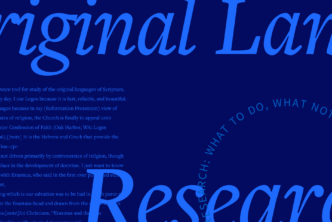Freedom means different things to different people. To a man like John Knox, it meant being released from the harsh labor of serving on a French galley ship so he could preach the gospel. To the American Sons of Liberty, it meant taxation with representation. To a slave like Frederick Douglass, it meant crossing the Mason-Dixon line and escaping the whip of the master in the South. To a suffragette like Susan B. Anthony, it meant giving women the right to vote. And for many people today, it means having the freedom to “be yourself,” even if this means denying obvious truths—about your body, about morality, about God’s existence.
Freedom is defined in all kinds of ways by different people. It can be personal, physical, political, moral, sexual, emotional. Jesus spoke about freedom as well, and in John 8, he defined freedom in a strikingly deep and universal way, showing us the kind of freedom he offers people from every background. John 8:31–38 (ESV) reads as follows:
So Jesus said to the Jews who had believed him, “If you abide in my word, you are truly my disciples, and you will know the truth, and the truth will set you free.” They answered him, “We are offspring of Abraham and have never been enslaved to anyone. How is it that you say, ‘You will become free’?”
Jesus answered them, “Truly, truly, I say to you, everyone who practices sin is a slave to sin. The slave does not remain in the house forever; the son remains forever. So if the Son sets you free, you will be free indeed. I know that you are offspring of Abraham; yet you seek to kill me because my word finds no place in you. I speak of what I have seen with my Father, and you do what you have heard from your father.”
This passage includes the wonderful promise that “if the Son sets you free, you will be free indeed.” Jesus here offers so much to us. To be “free indeed” sounds refreshing, hopeful, invigorating.
But what exactly does it mean? How does the freedom Christ offers compare to the types of freedom so many Western people are campaigning for? There is much to see here, but let’s focus on just a few of the details this passage shows us about Christian freedom.
Christ’s freedom is anchored in truth
When Jesus speaks of freedom, he connects it to “truth”: “You will know the truth, and the truth will set you free” (John 8:32).
Many calls for freedom today are calls to unmoor freedom from any truth. Truth has become a disputed concept in our world of alternative facts, because truth is exclusive. It suggests an absolute standard to which everyone must conform. If truth can be dislodged from its place as the foundation of our lives, then we are “free” to do whatever we want.
But Jesus rejects that kind of thinking, because such notions of freedom are not grounded in anything solid. What Jesus offers is a freedom that has substance, that has a reliable foundation: truth. It is by knowing the truth that we become free. In fact, Jesus casts truth as the actual agent that frees us.
We may tend toward our own ideas about what constitutes freedom, but only as it is grounded in God’s truth do we find real freedom. And that true freedom, which Christ offers, is both freedom from and freedom for.
Christ’s freedom is freedom from sin
Contrary to today’s popular concept of freedom, which wants freedom from some outdated morality, Christ’s freedom is freedom from sin. If we’re honest with ourselves, this is not exactly the freedom we long for. We’d rather have our sin and not get found out.
But Jesus loves his people too much to just look the other way. Jesus offers freedom from sin. Freedom from pride, envy, anger, sloth, gluttony, avarice, and lust—to borrow the seven deadly sins as a sample list.
This freedom is exactly what we need, because without this kind of freedom, we are stuck. And we’re stuck in the worst way, because we are slaves—“slaves to sin,” to be exact.
I always find it ironic in this passage that the Jews claim that they have never been enslaved to anyone. Are they forgetting Egypt? The exile? The Roman Empire’s iron grip on their nation? Perhaps they are thinking that they have never been spiritually enslaved to anyone.1 Despite their delusions, they are slaves, slaves to an even harsher master than Pharaoh or Nebuchadnezzar or Herod. They are slaves to sin. And so are we.
The problem with slavery is that you’re stuck. You’re chained, and you can’t escape. But Jesus sets us free from the master of sin.
So Christ’s freedom is anchored in truth. It is freedom from sin. And it is also freedom for something.
Christ’s freedom is freedom for sonship
Freedom is often defined only as “freedom from,” but in John 8, Jesus clearly defines freedom in terms of sonship. Here I am leaning on Geoff Ziegler, my pastor, who develops the theme that we are “free to be sons of God” in his book of the same title, where he traces this theme throughout Scripture and applies it to various Christian approaches to the concept of free will.2
In the John 8 setting, the picture is of a house servant who works for some time in his master’s house but eventually moves on: “The slave does not remain in the house forever” (John 8:35). The slave can be discarded and forgotten. There are no family ties to keep the slave.
But the son is secure. Indeed, “the son remains forever” (John 8:35). What Jesus does in his redemptive work is both free us from sin and free us for sonship. In the remarkable work of God’s adoption of sinners as sons, as Paul explains it, God makes us his children, “and if children, then heirs—heirs of God and fellow heirs with Christ” (Rom 8:17). And we have the encouragement of the Spirit testifying to our spirit “that we are children of God” (Rom 8:16).
The use of the term sons is significant because in this time, daughters did not receive the inheritance. However, all God’s children become “sons” in the sense that they all—male and female—receive the inheritance with Christ. Jesus, the Son, remains forever, and now we, as “sons” of God, also remain forever.
In this view, we are no longer slaves to sin, but we are sons—fully vested children of God—who can live out our lives in freedom. We are freed to live like Christ without fear of reprisal or being cast out of the house. We are secure because Christ has saved us, because the Spirit seals and sanctifies us, and because the Father loves us as his children.
And based on that truth, Jesus says to us, “If the Son sets you free, you will be free indeed.” Free indeed. That’s what we want. Jonathan Edwards captures this true freedom with a striking image of a prison:
When a man first gets into Christ he comes out, as it were, of a stinking, dark dungeon into liberty, and although he loved his dungeon while he was in it because he knew not there was any better place in the world, yet when once he has had experience of perfect liberty he would not return again into it for all the world.3
That is “free indeed”—free from a stinking dungeon, free to love that which is actually good, and free through being shown truth. And by God’s grace, that is the freedom that is given to all God’s children in Christ.
Oddly enough, we tend to be like the Jews who said that they have never been enslaved to anyone. We tell ourselves the same blatant, self-serving lie. But we, too, are enslaved—if not to banks or bosses, at least (and more significantly) to sin. And for those of us who experience more overt forms of slavery today, the truth Jesus offers is that we can be truly free regardless of our horizontal circumstances. For no matter what situation we find ourselves in, no one can ever take away our status as sons of God.
Jesus Christ offers us a freedom that is better than any earthly freedom. And so we may walk with confidence in the freedom of Christ, knowing that it is based on truth, that we have been freed from sin, and that we have been freed for sonship—for living as true children of God.

***
This article was originally published in the July/August 2021 issue of Bible Study Magazine. Slight adjustments, such as title and subheadings, may be the addition of an editor.
Related articles
- 7 Things about the Bible I Wish All Christians Knew
- An “and” That Matters: Translating and Reciting John 14:6
- Studying the Bible? 9 Tips (and the Best Resources)
Related resources
Free at Last: Experiencing True Freedom Through Your Identity in Christ
Regular price: $7.99
Sermons and Discourses, 1720–1723 (The Works of Jonathan Edwards, Vol. 10 | WJE)
Regular price: $39.99
- Cf. Darrell L. Bock, Jesus according to Scripture: Restoring the Portrait from the Gospels (Grand Rapids: Baker Academic, 2002), 466–67.
- Geoffrey M. Ziegler, Free to Be Sons of God (Phillipsburg, NJ: P&R, 2018), esp. chap. 5.
- Jonathan Edwards, “Christian Liberty,” in The Works of Jonathan Edwards, vol. 10, Sermons and Discourses, 1720–1723, ed. Wilson H. Kimnach (New Haven: Yale University Press, 1970), 623.




